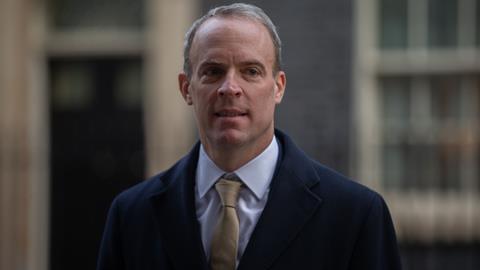Amid the nuanced picture set out by Adam Tolley KC in his report on allegations of bullying by Dominic Raab, one thing is clear: these were not complaints from a bunch of snowflake civil servants who could not stand a few home truths.
Tolley made the point that there was no lack of resilience from anyone who spoke out, and staff accepted that ministers were entitled to have high standards and to make constructive criticism of their work.
What appears to have done for Raab was that he failed to realise he was being intimidating and insulting to staff, and failed to respond and change quickly enough when senior officials warned him that colleagues were unhappy.
While Raab continues to insist the report’s findings would encourage ‘spurious complaints’ and that he was entitled to give ‘direct critical feedback’, he was too tin-eared to know when he had crossed the line. Raab didn’t need to be a bully to have lost his job: he lost his job because he did not realise he was regarded as one.
The Tolley report will be digested particularly keenly in the offices of the Solicitors Regulation Authority, which is about to embark on its own journey of discovery about how to manage and regulate behaviour at work. This week the solicitors regulator secured LSB approval to change the rules around workplace culture.
Firms must as a regulator requirement ensure that staff are treated fairly and with respect, and managers are obliged to challenge behaviour that does not meet this standard.
The language is still a bit woolly and undefined, so the assessment of Raab’s conduct (and let’s not forget, he is himself a solicitor) should be invaluable.
He was prone to banging on tables and sticking out a hand to silence colleagues: neither was deemed likely to cause alarm or threatening, even if those unused to such a style might find it disconcerting.
Raab did not shout or swear at individuals and never lost control. The former lord chancellor was forthright and had high standards, offering little room for nuance in his messaging and framing responses in black and white. Again, Tolley does not suggest this amounted to bullying on its own.
But in meetings with policy officials, his manner was intimidating and went further than simply delivering critical assessments. Describing work as ‘utterly useless’ and ‘woeful’ was personal criticism, not constructive feedback.
Crucially – and you would not be surprised to see similar wording in a future SRA prosecution – Raab ‘did not intend by the conduct described to upset or humiliate [but] he did not always have in mind the impact of his approach at the level of the individual who was affected by it’.
Tolley says Raab ‘ought to have realised earlier that some individuals would find it difficult to cope with his style and should have adjusted his behaviour accordingly’. Raab had curbed his ‘abrasiveness’ since the investigation began, but should have altered his approach earlier.
The same law firm owners who see Raab as condemned by a generational lurch to weakness and an inability to take criticism, are the same ones who might eventually see themselves hauled before the SDT. Rather than see Raab as a martyr of the snowflake era, they should see him as a barometer of changing times. The former lord chancellor is on the back benches because he could not understand what he was doing was wrong – those in the legal profession would be wise not to repeat his mistake.
This article is now closed for comment.





































12 Readers' comments